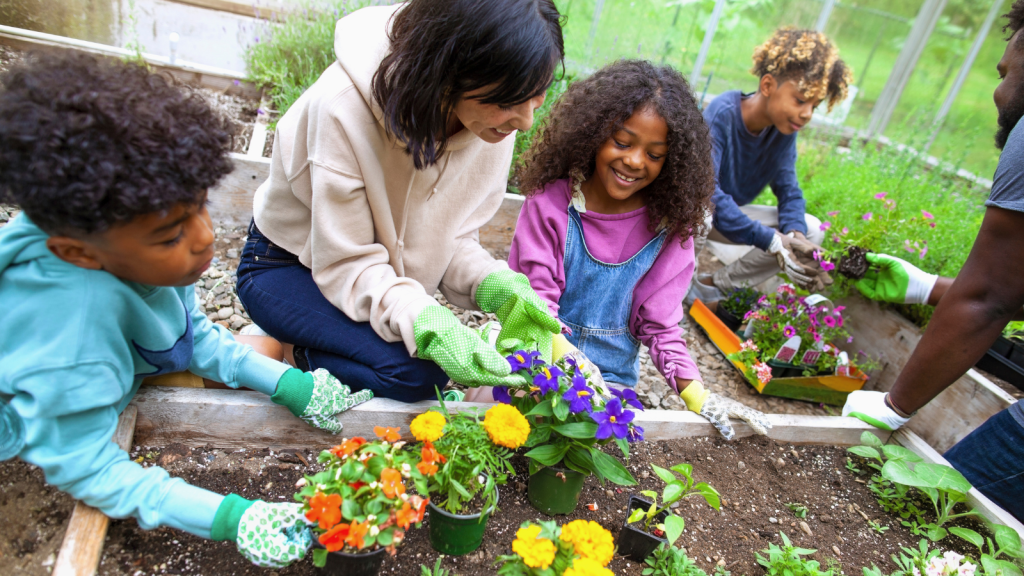Raising independent children is a goal many parents aspire to achieve. This journey starts at home through engaging in everyday activities that are both enjoyable and developmental. These activities strengthen family bonds and instill essential life skills in children. Here are some engaging activities to help your child learn and become self-reliant.
Culinary Adventures: Teaching Nutrition and Basic Cooking
Cooking together is a fantastic opportunity to teach children about nutrition and basic cooking skills. Start by selecting simple recipes that incorporate superfoods. For example, making a smoothie with berries, spinach, and Greek yogurt is fun and educational. Discuss the health benefits of each ingredient, like the antioxidants in berries and the protein in yogurt.
Teach children how to store ingredients properly, such as keeping avocados in a cool, dark place to maintain freshness. Involve them in the entire process, from grocery shopping to preparation to cooking, emphasizing the importance of cleanliness and safety in the kitchen. This hands-on approach educates them about healthy eating and instills responsibility and self-sufficiency.
Gardening: Understanding Nature and Responsibility
Gardening is an enriching activity that teaches children about nature, patience, and responsibility. Start with easy-to-grow plants or vegetables, and assign your children specific tasks like watering, weeding, or harvesting. Explain the importance of each task and how it contributes to the plant’s health.
You can also use this opportunity to teach about the environment and the importance of sustainable practices. Watching their plants grow from seeds to full bloom or harvest provides a tangible sense of achievement and teaches the value of nurturing and caring for living things.

DIY Projects: Boosting Creativity and Practical Skills
Engaging in DIY projects can be both creative and practical. Simple projects like building a birdhouse or decorating a photo frame teach basic tool usage and artistic skills. These activities encourage problem-solving and critical thinking as children learn to follow instructions and adapt to unplanned things.
Financial Literacy: Managing Money and Making Decisions
Teaching children about money management is crucial for their independence. Start with a piggy bank and, as they grow older, introduce concepts like budgeting and saving. Involve them in simple family financial decisions, like planning a grocery budget. This helps them understand the value of money and the importance of making informed decisions.
Home Chores: Fostering Responsibility and Teamwork
Assigning children home chores is a key way to teach responsibility and teamwork. Start with simple tasks like making their bed or cleaning their room, and gradually introduce more complex chores like meal preparation or laundry sorting. Create a chore chart to track their tasks and progress, which can motivate and help them understand the concept of responsibility.
Encourage teamwork by involving the whole family in tasks like weekend cleaning the house. This teaches practical household skills and the importance of working together as a family.
Outdoor Adventures: Encouraging Exploration and Physical Fitness
Outdoor activities like hiking or cycling are excellent for physical fitness and encourage a love for exploration. These activities can teach children about nature, geography, and the environment. They also provide opportunities for problem-solving, such as navigating a trail or learning how to fix a bicycle chain.

Planning Family Outings: Enhancing Organizational Skills
Involving children in planning family outings can significantly enhance their organizational and decision-making skills. Encourage them to research and suggest destinations, considering weather, distance, and available activities. Guide them in comparing options and making a final decision.
Once a destination is chosen, involve them in more detailed planning, like packing essentials, estimating travel times, and scheduling activities. This teaches them about time management, preparation, and adaptability. Such involvement makes the outing more exciting for them and imparts valuable lessons in planning and organization.
Shaping Tomorrow: How Family Activities Forge a Child’s Future Success
These family activities are more than just ways to pass the time; they are foundational experiences that equip children with essential life skills, preparing them for a successful and independent future. Through culinary adventures, children learn about nutrition and the value of healthy eating, skills that are crucial for their lifelong well-being. Gardening teaches patience, responsibility, and an appreciation for nature, nurturing a sense of environmental stewardship.
DIY projects and home chores instill practical skills, creativity, and teamwork. These activities cultivate problem-solving abilities and a can-do attitude, traits that are invaluable in both personal and professional contexts. Although seemingly simple, financial literacy activities lay the groundwork for financial independence and intelligent decision-making, empowering children to handle one of life’s most critical aspects confidently.
Outdoor adventures and the organization of family outings foster physical fitness, exploration, and organizational skills. These experiences encourage a love for adventure and learning and the ability to plan and execute tasks effectively. These skills build a strong foundation for independence, resilience, and adaptability.
Empowering Independence: Fun and Developmental Family Activities for Building Life Skills
Ultimately, these activities are about teaching specific skills and nurturing well-rounded individuals prepared to face the world with confidence. By investing time in these shared experiences, parents create cherished family memories and play a pivotal role in shaping their children’s future. The lessons learned, and the qualities developed through these activities will serve as invaluable assets, guiding them through the challenges of adulthood and helping them achieve a fulfilling and independent life.
By incorporating these activities into daily life, parents can rest assured that they are providing their children with the tools they need to thrive in the future. This approach to parenting, blending fun with developmental experiences, is a powerful formula for raising capable, confident, and independent individuals ready to make their mark in the world.



